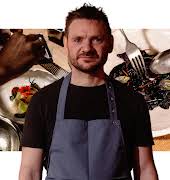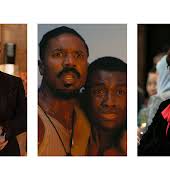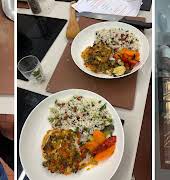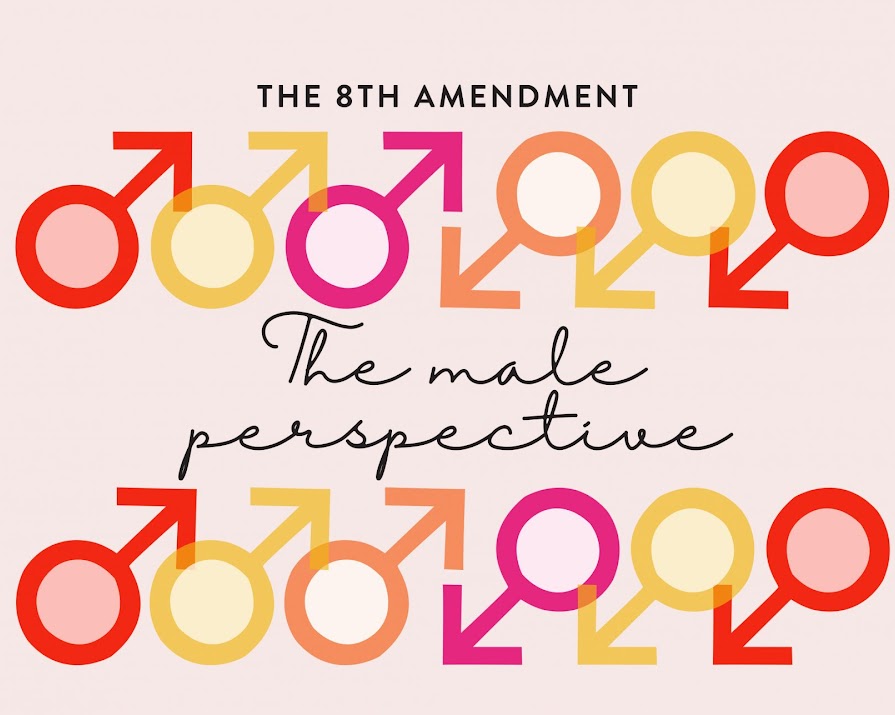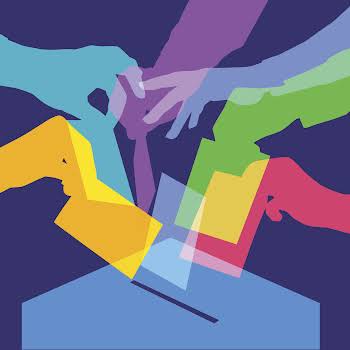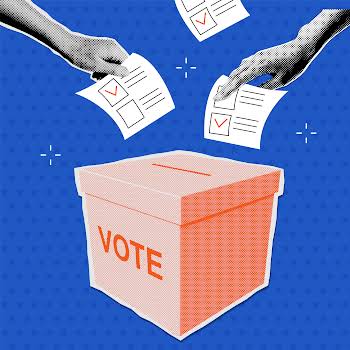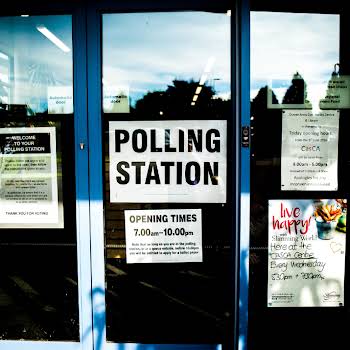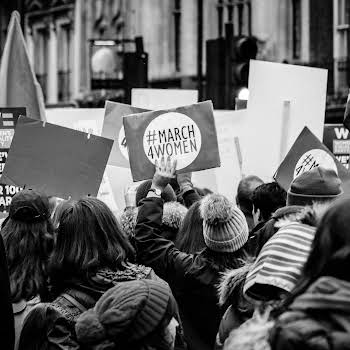
By Amanda Cassidy
30th Apr 2018
30th Apr 2018
The abortion referendum may be viewed by some as an exclusively women’s issue, but that doesn’t mean that men should be marginalised from opinion or action. Amanda Cassidy speaks to dads, brothers, partners and sons about their perspective on abortion reform.
Kieran’s story
“I had no idea during that 20-week scan of the pain and heartache that lay ahead.” When Kieran and Tracey were given a devastating prognosis for their daughter, Grace, they clung to the hope that maybe things wouldn’t be as bad as they thought. Unfortunately, that wasn’t the case, as Kieran explains: “What we were told floored us, our baby had a condition called skeletal dysplasia – a form of dwarfism, but this form was fatal. We were told that her chest was too small for her lungs and her heart to form properly. We decided because of Grace’s prognosis to deliver her early. We couldn’t bear to wait and watch her suffer. Tracey was getting bigger by the day, our 3-year- old twins and 12-year-old were very excited to see their sister, I had to sit our daughter down and explain to her she was never going to meet her little sister. We got an appointment for March 17th, and set off to Knock airport for our 4pm flight to Liverpool along with all the hens and stags. We got into hospital and from the very beginning, the staff were amazing. Tracey was given her first tablet to start the process the next morning. By the next day, Tracey was in really bad pain.
“I stood there, of no use to her as she cried with pain. It was the loneliest and most scared I have ever been in my life.”
“At 4.45am on the 19th of March, Grace arrived silently into the world. I guess everything that had bottled up over the last few weeks just came to head then and I broke down when I should have been comforting my brave wife. She was really the most beautiful little girl with plump little lips, a button nose and dark hair. When Tracey woke, she held her and we laughed and cried about how much her sister and brothers looked like her. Grace’s funeral was organised from Tracey’s hospital bed. We decided to have Grace cremated but we would have to wait a few weeks before her ashes came home.”
Kieran says that although they were both going through the pain together, he felt it was much worse for his wife.
“We had to leave the hospital that evening because we had an early flight the next morning. Watching Tracey place our little angel in that crib and having to leave her behind and watch the pain and hurt in my poor wife’s face was like someone ripping my heart out. Tracey was inconsolable and there was absolutely nothing I could say or do. Grace came home about 3 weeks later. She was delivered by a courier and Tracey had to sign for her. I don’t think I need to explain how this makes me feel – having a grieving mother sign for her daughter’s ashes like a package and to try and explain that to our children.”
Kieran says that they respect and empathise with those couples who choose to carry their pregnancies to term when they get the same fatal (not-life limiting or disability) diagnosis.
“The same respect should be shown to us, we are bereaved parents, just like them, but we needed to travel 500km to find someone to help us.”
Gender Nuances
At a recent march in Dublin city centre, one activist was criticised for telling the men in attendance to ‘know your place – this is a woman’s movement” She was accused of displacing men from the debate. Afterwards, it was explained that the sentiment was that men involved in the movement should be “supporting and not dominating the conversation” But is there a danger that the ‘us and them’ gender nuances may actively encourage men to stay out of it completely?
JP Johnson fears that men are being encouraged to vote more in consideration of the women in their lives rather than for their own opinion. He and his wife, Cliodhna were given a very tragic diagnosis for their baby son at their 20-week scan.
JP’s story
“It was a huge shock. We were told that our son, John Paul, would only live for a short amount of time after his birth. My immediate thought was ‘how do I fix this’? Abortion did cross my mind for those first few shocked seconds. I suppose it is a form of denial. My next thought was how do I help my wife get through this? The midwife who had done the scan called the hospital consultant and he confirmed the diagnosis of Anencephaly which meant our son wouldn’t live long after birth. Straight away he told us that if we wanted to pursue termination it wasn’t possible in this jurisdiction. That surprised me as quite a crude thing to say to parents who had just discovered some really horrific news about their child. From then on though, the hospital was a great support for us. My wife was booked in for separate appointments so she wasn’t in the waiting room alongside mums with healthy pregnancies. We decided to cherish the pregnancy, despite our grief. Every morning when my wife felt our son kick, she said it was great to know there was this little person in there. She felt that each kick was a wonderful thing because his life was going to be so short – this was all part of it. We found those months gave us the time to prepare emotionally and to adjust the other children to the fact that their little brother wasn’t going to live very long.”
John Paul was born at 32 weeks and he lived for 17 minutes.
“I held him for four of those minutes. He was a lovely little newborn. He moved his little head, opened one eye and stuck out his tongue at me. His condition was very severe, so that’s all he did. But in his tiny life, those tiny things are what I remember so vividly and with great affection. He died peacefully in our arms. For any family to go through such a diagnosis is devastating but for us, the alternative – going to the UK and feeling those kicks stop and not to have those very positive memories – I find hard to imagine how that could possibly be better? My sadness over the death of my son unfolded very naturally and I think that helped towards the healing. I think many people think what we did would be too overwhelming but I’d say to people that you would be amazed how strong it can make you. I’m so proud of my son. I’m so proud he has a birth cert and was, for 17 short minutes, a member of Irish society. He made his tiny mark on this life – and we gave him a chance to do that.”
JP and Cliodhna set up One Day More which offers support to families who are facing similar tragic diagnosis.
Perception versus reality
Corey Whyte is a pro-choice activist in Sligo. He says that the perception of a marginalisation of men throughout the debate over the Eighth Amendment is not the reality.
“There is a difference between being quiet and allowing those affected by the Eighth Amendment the opportunity to speak out. I’ve never felt that my voice was any less important because of my gender. The Eighth Amendment legislates for the body of a woman – an invasive and personal place that the Constitution should not govern. Ultimately, it is up to the woman to decide what’s best for her. It is a woman’s body and for her to be asked to continue with a pregnancy that she is not comfortable with doesn’t seem right. In this debate, everyone can be supportive and active – male or female, without having to take over the podium.
“Don’t be fooled into thinking that just because you aren’t hearing the male voice it is a negative reflection of their support.”
“From what I am hearing from the doorsteps, from men, young and old, is that we are right up there alongside the women of Ireland.”
Motivated
In Dublin city centre, we spoke to men about their voting appetite for this particular referendum. One student told us: “I think there is a resurgence in the last few weeks where men are no longer embarrassed to talk about something like abortion. I think there are those who are still very quiet about their views. The hope is that will translate into votes on May 25th.”
We also spoke to a new dad who told us; “The most powerful aspect of this referendum is in relation to fathers. I think that dads are now thinking about how this could affect their own daughters. There is something very visceral about that bond – a protectiveness that if they don’t do something now, it could affect their child in the future. That is a powerful thought that I think will motivate many of us to get out and vote.”
This man explained to us that while he felt it wasn’t about him at all, he still felt compelled to vote: “I’d like to trust the government to do the right thing and legislate for this outside of our Constitution but I think the Eighth is there to protect the unborn child and I think this will just open up the floodgates for abortion on demand.”
Supportive and respectful
Last week, columnist with the Irish Times, Fintan O’Toole didn’t shy away from giving his opinion on the issue. In speaking about his own experience with abortion in the past, he said he instinctively knew that this wasn’t about him. “A male friend my own age called in and asked me to go with him to his house. His mother and father were in the sitting room with his sister who was, I think, 16. She was pregnant and she had made up her mind that she did not want to have the baby. Did I know how to go about arranging to have an abortion in England? Sitting on the couch looking at that girl, two things were immediately obvious. One was that this was not about me or my feelings at all – it was about her. And the other was that the part of her that was most important here was not really her body. It was her mind, her free will, her right to make the decision she had come to. I just knew that I’d be a pompous little prig if I walked out. And I just knew that I’d be a miserable little coward if I hid behind my ignorance.”
This isn’t just a female-fight – we talk about raising our sons to be feminists and teaching men to respect equal rights, so it is completely normal that they should be up there, alongside us, campaigning and voting and shouting and caring. This was never going to be a black or white issue, and it certainly isn’t a gender issue.
There are many strands to this very sensitive debate. How do men support women and acknowledge body autonomy while also being supportive and respectful of the conversation women are having? Easy. It simply comes down to your own principles, knowing in your heart what is the right thing to do, and being able to affect an outcome. Whatever way you vote, that alone is a powerful thing.



